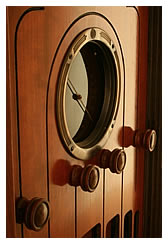
"The is the Columbia Broadcasting System."


"The is the Columbia Broadcasting System."
It was apparent very early in my life that I was destined to be a communicator, a purveyor of information.
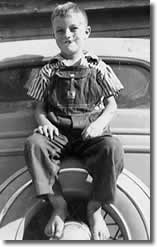 |
| Young Purveyor |
One summer afternoon about 1940, on the front porch of our little unpainted, unelectrified tenant house, my mother was entertaining Miss Nolie Bridges, who had walked a mile up the dirt road to pay a visit. Miss Nolie (pronounced KNOW'lee) and mother were sharing the porch swing and I was sitting on the floor, listening as they talked. In my five-year old wisdom, I thought it would be entirely appropriate to inject my thoughts—whatever they may be—into the conversation. "Miss Nolie," I asked, "Do you know what Grandpa said?"
There was a pause. In unison, their eyes swung down to me. My mother's were filled with a look of unmistakable foreboding, a fear of what was coming next. Oh, please, God, no, she surely thought.
"Well, no, son, I don't," Miss Nolie said.
Proudly, I delivered the answer. "He said Max Whitaker is a shitass."
As if a dark cloud had suddenly obscured the sun, a pall settled over the porch. Miss Nolie looked at the little round watch pinned to her bosom. "I believe I better get on home and fix Roscoe's supper," she said, and headed off down the road.
For years after, whenever my aunts and grandmother were about to exchange a bit of gossip, as if by reflex all would look around to see if I was in the room. And upon finding me within earshot one would say, "Now, Reno, don't you go tell Miss Nolie."
In those days my world view was limited to what I could actually see on that little farm, or what I heard on WBT and the other clear channel stations of the time, including WJJD in Chicago ("the nation's station," the announcer intoned, followed by the sound of a heavy hammer striking an anvil), WSM in Nashville, WCKY in Cincinnati, and the "X" stations down along the Rio Grande.
My grandparents, who lived just down the road, were always tuned in to war news and at the age of five or six I became familiar with and could identify the voices of CBS Radio, as its correspondents voices crackled over the shortwave from around the world. I can remember to this day the sounds of Murrow, Shirer, Collingwood, Severeid, LeSeur.
Since I wasn't concerned with my wartime safety (Grandma had told me with certainty that the Lord wouldn't let the Japs come over and harm us), I could concentrate on becoming a radio junkie. I mentally filed away everything I ever heard, the stations, programs, personalities, actors and announcers. I never missed the Briarhoppers and the Lone Ranger, but somehow, out on the farm, or maybe it was our aerial, we could only receive WBT clearly in the afternoon, so I missed a lot of the kids' shows like Terry & The Pirates, The Cisco Kid and Captain Midnight.
The first movie I can remember seeing was a Gene Autry western. Although I can't remember its title, the plot has stuck with me. Gene and Frog had been tied up in a line shack (in many westerns there was a line shack, whatever that was), and Gene escaped his bonds by soaking the ropes on his hands (behind his back) in a wash pan—full of water— left on the table by the perpetrators. Yeah, right.
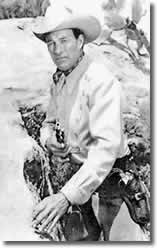 |
| Bill Elliott |
I loved the Red Ryder westerns with Bill Elliott in the title role, and Bobby Blake (former Our Gang kid, and recent suspected wife-killer) as Little Beaver. Of course I was fully aware that it was a Republic picture. I could readily recognize the sets and locations used repeatedly in various Republic productions. I only had to hear a gunshot to know the picture was from Republic. Their gunshots had a distinct quality, sounding like that of no other studio. I also know that, in the'40s westerns by Republic, the bad guy would inevitably be played by actor Roy Barcroft.
Elliott also had another Republic series in which he was billed as Wild Bill Elliott ("I'm a peaceable man"). In one forgettable picture, Elliott sussed out the identity of a killer by the pattern of a presumably innocent character's pacing. This erstwhile model citizen, when presented with a worrisome problem, would pace in a four by six rectangular path, just like someone would have done in a jail cell! Aha. This man has served time, so, ergo, he's the killer! What a crock.
All the major studios had their contract players and I knew where they belonged. Barbara Stanwyck? Paramount. Alice Faye, Betty Grable and Henry Fonda? Fox. Esther Williams and June Allyson: MGM.
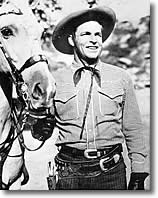 |
| Buster Crabbe |
The cheesiest pictures were made by "studios" like PRC (Producers Releasing Corporation). PRC, I later learned, was owned and operated by a man so greedy and mean that his company was pronounced "Prick"). When in the fifth and sixth grades I used to go to the Carolina Theater in Shelby and see their Saturday double bill, one picture of which would likely be one of PRC's "Billy the kid" series. Billy (bearing no resemblance to anyone living or dead) was played by Buster Crabbe, an early Tarzan. His goofy sidekick was bewhiskered Al St. John (who years before had been one of the Keystone Kops). If those films cost $200 to make, I would be surprised.
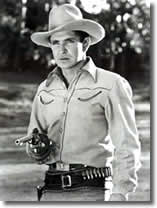 |
| Bob Steele |
I knew that Monogram made the Johnny Mack Brown series and that RKO did the Tim Holt westerns. I enjoyed studying the westerns shot in the early '30s before I was born, many made by Mascot, a predecessor of Republic. Many old name cowboys toiled there, Ken Maynard, Tom Mix and Bob Steele, who was in yet another Billy the Kid series. Those old films, more apt to be shown at Shelby's Webb Theater, were intriguing to me. They had no music track and were padded with needless footage. If Steele was riding hell bent for leather from location A to Location B, we'd see the entire trip, over the prairie, across the stream, around the butte, through the pass. All the while, in every shot, we'd hear his wild-eyed, lathered steed wheezing as if he was near collapse. By the time he reached B, all us little kiddies would be bleary-eyed and benumbed.
I loved non-western movies as well. One night in 1944 when I was nine, toward the end of "Wilson," a bio of former president Woodrow Wilson, which I was enjoying immensely, I turned and noted that I was not only the sole kid in the theater, I was the only person in the theater. Note to myself: I never saw another movie starring Alexander Knox.
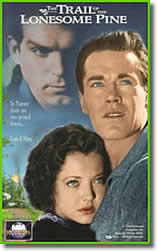 |
One of my favorite movies of all time is the first full-color feature, Fox's 1935 production "Trail of the Lonesome Pine." Although I don't know where I saw it, I remember almost everything about it. It starred Henry Fonda, Sylvia Sydney and Fred McMurray, with Fuzzy Knight as "Tater." Set in the Kentucky or West Virginia hills, it was a traditional tale of mountain people fending off progress, in this case land grabbers who were going to exploit the area's coal. In the struggle, a young boy is accidentally killed and, as his little coffin is bourne up to the graveyard, Tater tearfully sings the title song: "When it's twilight on the trail, and my voice is still, please plant this heart of mine, underneath the lonesome pine ...on the hill." Mercy, that was good.
I fell in love with Sylvia's pale blue eyes. It nearly broke my heart when I learned many years later that, at the time the movie was shot, this beautiful, sweet, angelic darling—surely a virgin—was the mistress of B.P. Shulberg, a producer twice her age.
I became intrigued by the production process in all the media, and was able to tell the difference between mediocre and higher quality work. Money shows. Mutual's stuff didn't hold a candle to that of CBS.
A few things puzzled me: When listening to comedy shows like Bob Hope and Jack Benny I couldn't understand why the audience died laughing at lines that weren't the least bit funny. Were the actors doing visual gags that the radio audience couldn't see? Another thing: The more important shows would always do two performances a night, one for the east coast and one later for the west. Why didn't they just make a transcription of the first show and play it back for Pacific time?
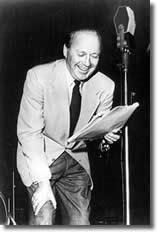 |
| Jack Benny |
Generally speaking, audiences in those days were predisposed to laugh at anything. If Gracie Allen simply said "Hello, George" it was supposed to be funny, wasn't it? You would go to an Abbott and Costello movie back then and the audience—the theater would be packed—would laugh so hard and long you couldn't hear the dialogue. Today in theaters, the funniest line might draw a titter or two from the handful in the audience.
To this day, I can't watch a play or a movie without my attention being diverted to the techniques of staging or special effects. I never lose my awareness that, even for the most intimate and intense love scenes, behind the camera stands dozens of bored crew people, scratching themselves and wondering what's for lunch.
As much as I loved radio drama, in my mind I could always see the actors standing around a couple of microphones, reading from scripts. It almost, but not quite, ruined the web of magic they spun. I would learn their names, then see them years later in the movies or on TV, fine character actors like Frank Lovejoy, Ted de Corsia, Everett Sloane, Rosemary DeCamp, Gale Gordon, Hans Conreid, David Brian ("It shall be my duty as District Attorney to prosecute to the fullest extent of the law...")
The announcers were easy to identify for they almost always were allowed to give their names: "This is Harlow Wilcox speaking..." (Fibber McGee & Molly). There were Bill Goodwin, Art Gilmore, Jackson Beck, Andre Baruch, Ken Carpenter, Dwight Weist. By their voices you could often tell, without being told, what the show was and where it came from, for there were "New York Announcers" and "Hollywood" announcers. Art Gilmore and Ken Carpenter, for example, worked primarily on the west coast, on the Red Skelton ("Red'll be back in a moment, but first...") and Bing Crosby programs, respectively. In the fifties and sixties, Gilmore practically had the market cornered in the movie trailer voiceover business.
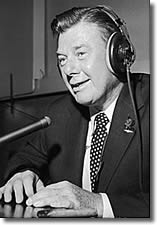 |
| Arthur Godfrey |
In the late '40s I became aware of Arthur Godfrey, the ukulele-playing redhead who, for the next two decades, was the biggest name in broadcasting. He had a morning CBS radio show from New York with announcer Tony Marvin, soloist Jeannette Davis (always billed as being "from Pine Bluff, Arkansas") and Archie Blyer's Orchestra (one member was guitarist Remo Palmieri). His theme song was "It Seems Like Old Times." Occasionally Arthur would sing his signature song, "In the Blue Ridge Mountains of Virginia (on the trail of the lonesome pine)." I can remember the lyrics to this day. "On the farm again, where men are men, broadcasting from my chick-en pen..."
Arthur was a star maker. He had a nighttime TV show called Arthur Godfrey's Talent Scouts that brought to the public's eye some of the big stars of later years, like Tony Bennett and Patsy Cline. In the fifties, Arthur's weekday morning radio fill-in during his vacations was a clever young singer named Merv Griffin whose only big hit had been "I've Got Lovely Bunch of Coconuts" (with Freddy Martin's Orchestra).
One of Arthur's sponsors was Chesterfield Cigarettes, whose pitch line was "Don't forget those Chesterfields!" Apparently Arthur didn't forget those Chesterfields, for in 1959 he was discovered to have lung cancer, and had one lung removed.
Arthur continued to be a big name in broadcasting until his show ended in 1972, and he quickly faded away. I knew that both Arthur and I were over the hill when, in 1980, when interviewing a young prospect for a producer's job at Jefferson Productions I mentioned Arthur Godfrey's name, she asked, "Arthur who?"
 |
| Not your grandson's Ipod |
When I was 14 or so, and we had moved to the little town of Cliffside, we had an old table model radio that had, in the back, a headphone jack and volume and tone controls. Somewhere I found a cheap set of headphones. I would sit behind the radio with a newspaper, plug in the 'phones, and when I'd hear Tony Marvin go into a break with the cue "The is the Columbia Broadcasting System." I'd turn down the volume, give a station ID (it would always be WBT), and read a little news or some announcement I'd made up, then "pot up" and return to the program. I was a broadcaster!
I would practice reading the news (out of the newspaper) to my mother. From someone I borrowed a little mike/amplifier set and set it up in our living room with the speakers out on the front porch. I would "broadcast" to passersby, who would cast puzzled looks at the house and pick up their pace, thinking that perhaps the Bailey residence had become some kind of asylum for the terminally weird. They were not far off the mark. I had a few 78rpm records I would present for their listening pleasure (by holding the mike to the phonograph's speaker): Tommy Dorsey's "Marie" and "Song of India," and Benny Goodman's "Jersey Bounce." I also entertained them with a wonderful five disc set by Spike Jones Band doing songs from the Charleston era like "Black Bottom," "Collegiate" and "Varsity Drag." This was not some of Spike's usual nonsense like "Cocktails for Two" but serious musicianship.
In those golden days WBT's Grady Cole and Kurt Webster were my gods. And I enjoyed Bob Raiford, a bright young talent on BT, who once got into hot water by taking to the airwaves and sticking up for Nat King Cole when the singer was treated badly at some Southern venue because of his race. I also kept tabs on WSPA's Farmer Gray, the morning man who dispensed bucolic chatter to listeners in the Spartanburg, S.C. area. Rumor had it that he did his shows standing up! How could he possibly do that? See? I was totally into process.
There were daytime stations that influenced me. WBBO in Forest City and WOHS in Shelby. On Saturdays at noon WOHS had a show with a little group formed around Shelby's own singer/songwriter Don Gibson, whose "Oh, Lonesome Me," "Sweet Dreams" and "I Can't Stop Loving You" years later became huge hits for performers like Patsy Cline and Ray Charles. "Stop" has been recorded by over 700 artists. But, in the late '40s, he was just another knockabout hillbilly trying to pay the bills.
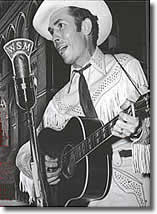 |
| Hank Williams |
I would always catch the Grand Old Opry on WSM. I "was there" (at the radio) when Hank Williams was becoming such a tremendous hit on the Opry. For several consecutive bradcasts (in 1950, 1 think), he sang "Lovesick Blues" to audiences gone wild. The history and legendary aspects of the Opry fascinated me, as they do today, maybe because my dad, when he thought no one was listening, would sing the old Roy Acuff songs, like "Great Speckled Bird" and "Wreck on the Highway" (and I didn't hear nobody pray). And after the Opry, about midnight, a show would emanate from "Ernest Tubb's Record Shop." (Were they really at his store, or was it being broadcast from a WSM studio?, I wondered. Process. Process.)
Of course, when television arrived in our town, it was a whole new world. I would use every excuse to visit our neighbors, the Robersons, as often as possible and slyly insinuate myself in front of their round screen. It was a couple of years before we got a Zenith all our own. I remember in exquisite detail one of the first telethons ever held on TV. I stayed up all night. It was an effort to raise money to send the U. S. Team to the 1952 Olympics in Helsinki, and was hosted by Bob Hope and Bing Crosby from the El Capitan Theater in Los Angeles. "This is a joint presentation of CBS and NBC...from Hollywood!" the announcer announced.
Of course I took note of the cheap tricks and cheesy sets in many of the mostly live shows. When a door closed on a soap opera or drama set, the canvas walls would shudder from the vibration. Guns would not fire. Miniatures looked like kindergarten projects. Actors forgot their lines.
And I memorized the melodies of all the theme songs. Ask me to hum the theme from Steve Allen's Tonight Show from the mid '50s. I can do it. That was the predecessor to Jack Paar's late night program, and featured young Andy Williams, Steve Lawrence and Eydie Gorme. It had Skitch Henderson's orchestra and the announcer/sidekick was Gene Rayburn.
There was one in a long list of mediocre kinescoped shows, "Martin Kane, Private Eye" that I regularly watched. It wasn't particularly a stellar production, but then I watched everything. It was sponsored by Sano Cigarettes. Remember those? For me, the show's theme was one of those "earwigs," a tune that embeds itself in your brain and resurfaces from time to time and stays around too long. It would resurface thirty years later at an improbable moment.
But what would I be when I grew up? What could I do? It really didn't matter, only that I had to be a part of the media.
One afternoon after school I was sitting on our front porch in Cliffside when a dirty old stake-body truck, loaded with construction equipment, stopped in front of the house. Two men in the cab began to study a roadmap. I walked out to see if I could offer any valuable advice. They told me they were from Ball Ground, a little town in north Georgia, and had a contract to go to Los Angeles and work on a mausoleum for the great movie director, Cecil B. DeMille, who was not yet dead, and they were on their way to do just that. I didn't point out to them that Cliffside was way, way off the route to Hollywood. I came within a centimeter of saying, "Slip over, I'm going with you."
But I didn't.
Coming soon, maybe: Part 2 - The Great Beyond